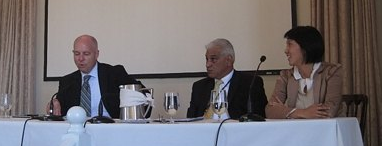
Gilad Edelman Photo
State criminal justice Mike Lawlor, Dan Jusino, and Emily Wang.
Emily Wang, director of a clinic that provides healthcare for chronically ill people recently released from prison, provides a service that many of Dan Jusino’s clients need. Yet until this week, Jusino didn’t know Wang or her clinic existed.
It’s an example of what Wang, a physician and a professor at Yale’s medical school, said was both New Haven’s biggest strength and its biggest weakness when it comes to prison re-entry programs: the sheer number of people and services devoted to the recently released means there are plenty of resources, but it also means those resources tend to be poorly coordinated and potentially overwhelming for the people they serve.
Jusino, who founded EMERGE Connecticut, a nonprofit construction company that gives work and holistic job training to ex-offenders in New Haven, and Wang took part in a panel Wednesday during “What Works: Moving From Theory To Practice,” a daylong symposium hosted by the City of New Haven Prison Reentry Initiative at the New Haven Lawn Club.
“There could not be more service providers” in New Haven, said Wang, who co-founded Transitions Clinic, which exists in 10 other cities across the country. “There is so much collective wisdom in New Haven that outshines some of the other cities in our network.”
On the other hand, that abundance can lead to inefficiency. Providers and researchers are often isolated, working in metaphorical “silos,” Wang said. “We can be better about breaking down those silos.” One consequence of the lack of coordination, she added, is that her patients end up with unmanageable sets of appointments with various agencies. (To help patients navigate the health care system — and in an inversion of the legal job discrimination felons typically face — Transitions Clinic seeks out former inmates to work as “community health workers,” using their familiarity with the system to assist clinic patients.)

Other conference attendees echoed Wang’s observations. Darius Henry Jones (pictured), a 26 year-old ex-convict, said that while there are many post-release services available, they “should be more accessible.” He pointed out that released prisoners are unlikely to have anyone helping them navigate the re-entry system. “People don’t know where to go,” he said. “It’s very intimidating to get any help.”
Jones said he was released from prison in 2008 after serving six months for two non-violent drug charges. Right after he got out, his parole officer told him about the EMERGE Connecticut program, then called Empower Enterprises, which he completed over the following year. That immediacy, Jones said, was essential.
“The most important thing is getting people right when they get out,” he said. If recently released people don’t start participating in re-entry programs quickly, “they go back to doing the same things” that got them in trouble.
Thanks in part to the “routine, purpose, and structure” he found at EMERGE Connecticut, Jones said, he has avoided that fate. A full-time accounting student set to graduate from Southern Connecticut State University in the spring, he is also the site coordinator for the Volunteer Income Tax Assistance program at Yale-New Haven Hospital. Jones hoped that the symposium would raise awareness of success stories like his.
“It’s very important that these people understand that change is possible.”